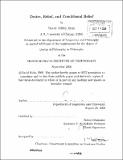| dc.contributor.advisor | Robert Stalnaker. | en_US |
| dc.contributor.author | Etlin, David Jeffrey | en_US |
| dc.contributor.other | Massachusetts Institute of Technology. Dept. of Linguistics and Philosophy. | en_US |
| dc.date.accessioned | 2009-06-30T16:34:07Z | |
| dc.date.available | 2009-06-30T16:34:07Z | |
| dc.date.copyright | 2008 | en_US |
| dc.date.issued | 2008 | en_US |
| dc.identifier.uri | http://hdl.handle.net/1721.1/45898 | |
| dc.description | Thesis (Ph. D.)--Massachusetts Institute of Technology, Dept. of Linguistics and Philosophy, 2008. | en_US |
| dc.description | Includes bibliographical references (leaves 127-132). | en_US |
| dc.description.abstract | This dissertation studies the logics of value and conditionals, and the question of whether they should be given cognitivist analyses. Emotivist theories treat value judgments as expressions of desire, rather than beliefs about goodness. Inference ticket theories of conditionals treat them as expressions of conditional beliefs, rather than propositions. The two issues intersect in decision theory, where judgments of expected goodness are expressible by means of decision-making conditionals. In the first chapter, I argue that decision theory cannot be given a Humean foundation by means of money pump arguments, which purport to show that the transitivity of preference and indifference is a requirement of instrumental reason. Instead, I argue that Humeans should treat the constraints of decision theory as constitutive of the nature of preferences. Additionally, I argue that transitivity of preference is a stricter requirement than transitivity of indifference. In the second chapter, I investigate whether David Lewis has shown that decision theory is incompatible with anti-Humean theories of desire. His triviality proof against "desire as belief' seems to show that desires can be at best conditional beliefs about goodness. I argue that within causal decision theory we can articulate the cognitivist position where desires align with beliefs about goodness, articulated by the decision making conditional. In the third chapter, I turn to conditionals in their own right, and especially iterated conditionals. | en_US |
| dc.description.abstract | (cont.) I defend the position that indicative conditionals obey the import-export equivalence rather than modus ponens (except for simple conditionals), while counterfactual subjunctive conditionals do obey modus ponens. The logic of indicative conditionals is often thought to be determined by conditional beliefs via the Ramsey Test. I argue that iterated conditionals show that the conditional beliefs involved in indicative supposition diverge from the conditional beliefs involved in learning, and that half of the Ramsey Test is untenable for iterated conditionals. | en_US |
| dc.description.statementofresponsibility | by David Jeffrey Etlin. | en_US |
| dc.format.extent | 132 leaves | en_US |
| dc.language.iso | eng | en_US |
| dc.publisher | Massachusetts Institute of Technology | en_US |
| dc.rights | M.I.T. theses are protected by
copyright. They may be viewed from this source for any purpose, but
reproduction or distribution in any format is prohibited without written
permission. See provided URL for inquiries about permission. | en_US |
| dc.rights.uri | http://dspace.mit.edu/handle/1721.1/7582 | en_US |
| dc.subject | Linguistics and Philosophy. | en_US |
| dc.title | Desire, belief, and conditional belief | en_US |
| dc.type | Thesis | en_US |
| dc.description.degree | Ph.D. | en_US |
| dc.contributor.department | Massachusetts Institute of Technology. Department of Linguistics and Philosophy | |
| dc.identifier.oclc | 320525627 | en_US |
